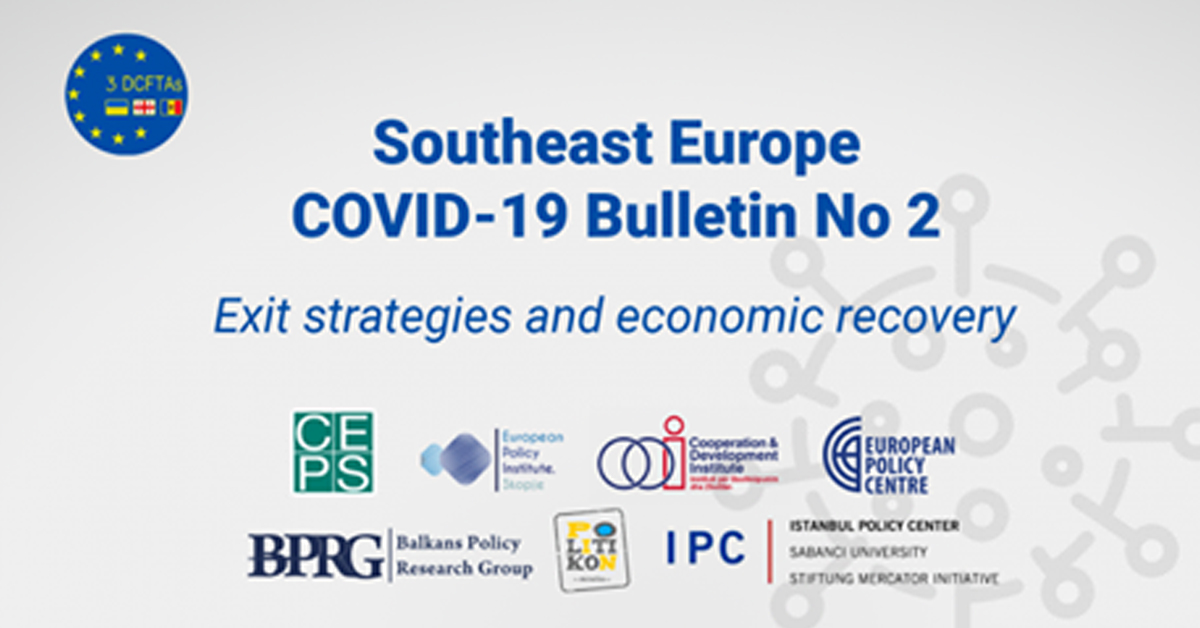Ready to end the lockdown?
In this second CEPS COVID-19 bulletin, we review the latest data on the Covid–19 pandemic in the Western Balkans and Turkey, the general easing of restrictions, the economic impact so far and recovery measures.
It comes a few days after the annual economic policy dialogue between the EU and the Western Balkans as well as Turkey which was devoted to the unprecedented challenges arising from the pandemic. In addition to short term measures being taken by the countries concerned, the participants agreed that this year’s policy guidance will focus on measures providing “an immediate fiscal, economic and social response to mitigate the impact of the pandemic as well as on the transition from these short term to more structural measures to foster the medium term recovery”. This dialogue follows the EUR 3.3 billion package announced by the EU on 29 April to support the Western Balkans in tackling the pandemic and the post-pandemic recovery.
A reading of the massive economic damage caused by the Covid-19 crisis in the Western Balkans and Turkey and the preventive and response measures taken so far underline the critical importance of the EU’s support (together with that of the EIB) and how much the countries concerned, whose economies are inextricably tied to that of the EU, are dependent on its continued assistance and solidarity for their recovery.
Epidemiological evolution
With the exception of Turkey, where the infection and death rates are continuing to rise – albeit at a slower pace than before, the number of infections and deaths due to Covid-19 appears to be under control and slowing down throughout the region. In Montenegro for example, there have been no new cases for ten days in a row.
Although the level of testing undertaken appears adequate in some countries, it nevertheless remains a weak point particularly in terms of capacity (as in Kosovo) and could be a critical factor should a second wave of infections occur.
Unwinding strategy
The easing of lockdown measures has been initiated in a phased manner throughout the region, although the speed of lifting restrictions varies considerably, with some public criticism over citizens’ behaviour in not respecting physical distancing (as in Turkey) or initial lack of coordination (as in Bosnia and Herzegovina). Political considerations on the pace of unwinding have started to manifest themselves in a number of cases such as North Macedonia where the prospect of early elections has increased the pressure for more rapid easing. In Montenegro, controversy over the behaviour of Orthodox clergy continues.
Economic Impact and recovery measures
The predictions of the massive damage to the economies of the region are reflected in the expected decrease of between 4 and 9% in the GDP. Worst affected are Montenegro (which has a public debt of 80% of GDP) and Albania (which, after the earthquake of November 2019, suffers from a second major economic shock in less than six months).
Increased levels of unemployment remain a critical factor not least in those countries which are heavily dependent on tourism (such as Montenegro, Albania and Turkey), and exports to member states (Serbia, Turkey). In Turkey, youth unemployment is expected to reach 40%.
A drop in diaspora remittances is also a major factor in the region, with Kosovo together with Bosnia and Herzegovina being the most affected.
All countries have put in place a series of recovery measures and stimulus packages with North Macedonia’s appearing to offer the most comprehensive set of measures, even including non-repayable loans to artists (and sportspersons), which would make their counterparts in the EU envious. Most of these packages include tax reductions and postponement of debt repayments, as well as in some cases loans and capital investments for SMEs, or a once off payment to all citizens (as in Serbia).
A critical factor remains that of the informal sector (which in Kosovo, for example, represents one third of GDP), with workers neither having contracts nor a social security safety net. Failure of government recovery measures to include this sector could result in further hardship and increased poverty levels, already high (according to some estimates up to 40% in Albania).
It is too early to determine whether all these measures will be sufficient, nor what impact they will have in addressing some of the most immediate needs of the citizens. A lot will depend on the efficiency and effectiveness in implementation, as well as on government oversight, respecting public procurement regulations as well as transparency in decision making by governments, some of whom (North Macedonia, Serbia) are facing electoral timelines/challenges. Read the full bulletin here.
This publication is prepared within the framework of the CEPS-led ‘3dCFTAs’ project, enabled by financial support from Sweden.

